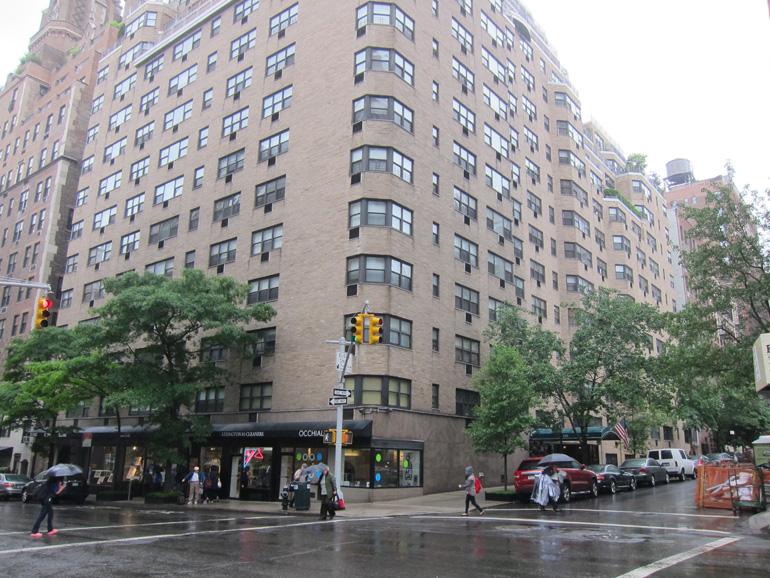Gotham Diary:
Tranquilized
28 May 2013
So, nu? My neurotransmitters are flickering. A big holiday weekend, a scarily effective bout of house-ordering, and now, today, the restoration of the last bits of furniture to the balcony. Also, a cushion and a table were delivered, permitting Kathleen to stretch out for a nap (were she at home, and the temperature considerably higher) and me to throw away the Big John’s cardboard box that I’d been parking my drinks on (done). A visit to Gracious Home yielded a round metal outdoor table so cunning and sunshiny-yellow that Gracious Home put it in the Third Avenue window. If only it weren’t so miserable and wet outside!
***
On Saturday, when the weather was also miserable and nearly as wet, I read most of Emma Brockes’s She Left Me the Gun, one of the best-written books that I’ve ever come across. There is really no way to summarize this dual memoir without spoiling it, because it is both brilliantly conceived and beautifully executed. The raw material — the awful stuff that happened to Brockes’s mother in and around Johannesburg and the warm and loving life that she later made for herself in and around London — would be depressing and jejune by turns if Brockes didn’t know how to shape it as well as she does, or how to infuse her sentences with a crackling dry wit that keeps the sordid and the sentimental equally at bay.
After her mother’s death (from lung cancer), Brockes decides to try to fill in the blanks in her mother’s stories — and what she has is mostly blanks. What she knows of her mother’s childhood and youth is unsettling, to say the least. There was abuse, there was a prosecution, there was gunfire. Brockes seeks out her mother’s half-siblings in South Africa, which her mother left at the age of 24. One of the brothers has died. Another has emigrated to Florida, and does not want to discuss his painful family history. (One of the three sisters is barely named in the text, suggesting a disinclination even to register her distress.) This leaves two brothers and two sisters to testify to the horrors of life with an abusive father. And that becomes the story. Not the abuse, which was absolutely unremarkable — men who prey on their daughters appear to come in one, horrible size. But the testimony and the aftermath, the children’s different ways of coping with the damage. There are good stories there, and Brockes unfolds them into the texture of her search.
One of the brothers, Tony, seems never to have amounted to anything. When Brockes meets up with him, he is minding an auto-repair shop while its owner is on holiday. Tony suggests repairing to a nearby casino for a coffee. Brockes’s transcript of the conversation is the self-portrait of a failure so compleat that Tony’s shreds of decent dignity are precious salvage, even as he remarks that “I’m basically quite a rotten person. … I’m violent and a drunkard.” In Brockes’s hands, however, the humanity of his situation is not banal but overwhelming.
I have been in the casino forever forever. I am never getting out. I have been here forever, I am never getting out, Celine Dion is never, ever going to stop singing. I excuse myself to go to the bathroom. It is dim in there, the ceiling the same midnight blue with the sparkly motif. I put the lid down and sit. How strange to be in a casino toilet, absorbing this information. The weight of detail in my uncle’s recollections is so crushing I can hardly breathe, but in the midst of my exhaustion I feel some measure of relief. Tony has corroborated that aspect of my mother’s story I always found it hardest to believe: not that there was abuse, but that there was in, spite of it, such tenderness. I flex my cramped writing hand and go back to my uncle.
Brockes’s mother managed to have her father prosecuted, after he assaulted a younger daughter, but the case collapsed when her stepmother retracted earlier statements. This defeat seems to have determined her mother to decamp to a new life in London — a violent and desperate uprooting for a young woman who had friends and a good job. Eventually, she married and had a daughter, the author, and was the only one of the children to die married to her first husband (or married at all, for that matter). She did not, in fact, leave “the gun” to her daughter.
Of everything she brought over with her it was the item she most wanted me to have. “This will be yours one day,” she said, long before those kinds of conversations were necessary. In the end, however, the price of a gesture can be too high to bear. In 1990, a gun amnesty was declared in Britain, and my mother decided that, after all, it might get me into trouble. Reluctantly, she laid it in a box like a dead pet and drove it to the police station. By the time she got back she’d cheered up. The female desk sergeant had squealed when she opened the box and called out to her fellow officers from the back room. It was the only contribution to the amnesty they’d had.
“They were completely intrigued,” said my mother, beaming. “I suppose I don’t look the type.”
That would be the type to drive your drunken father out of the house with five wildly mis-aimed shots from a pistol.

